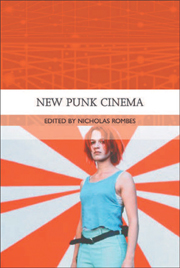Book contents
- Frontmatter
- Contents
- Notes on the Contributors
- Acknowledgements
- Introduction
- PART I BACKGROUNDS AND CONTEXTS
- PART II SCREENING NEW PUNK CINEMA
- 5 DVD and the New Cinema of Complexity
- 6 Digital Technologies and the Poetics of Performance
- 7 Navigating Chaos
- 8 Non-linear Narrative
- 9 Making it Real
- PART III CASE STUDIES
- Bibliography
- Index
9 - Making it Real
from PART II - SCREENING NEW PUNK CINEMA
Published online by Cambridge University Press: 05 August 2013
- Frontmatter
- Contents
- Notes on the Contributors
- Acknowledgements
- Introduction
- PART I BACKGROUNDS AND CONTEXTS
- PART II SCREENING NEW PUNK CINEMA
- 5 DVD and the New Cinema of Complexity
- 6 Digital Technologies and the Poetics of Performance
- 7 Navigating Chaos
- 8 Non-linear Narrative
- 9 Making it Real
- PART III CASE STUDIES
- Bibliography
- Index
Summary
I wonder what we'll play for you tonight
Something heavy or something light
Something to set your soul alight
I wonder how we'll answer when you say
‘We don't like you – go away,
Come back when you've learnt to play’
I wonder what we'll do when things go wrong When we're half-way through our favourite song
We look up and the audience has gone
Will we feel a little bit obscure
Think ‘we're not needed here,
We must be new wave – they'll like us next year’
The Wonders don't care we don't give a damn
(‘One Chord Wonders’, The Adverts)The Adverts were one of the earliest British punk bands of the mid-1970s that emerged in the wake of the Sex Pistols. The band was formed in late 1976 by two art students, TV Smith and Gaye Advert; early in 1977, several months before the appearance of Never Mind the Bollocks, Here's the Sex Pistols, the Adverts had released their first single, ‘One Chord Wonders’. In August 1977, Ian Birch wrote up the band for Melody Maker, wherein he described a recent concert:
‘[T]o put it mildly their set was a shambles. But, in a way, that is what has always appealed to me about the band. It never ceases to amaze me how they can stumble through one number, let alone a whole set. Every song constantly teeters on the verge of collapse as it careers along’ (Birch 1977: n.p.).
- Type
- Chapter
- Information
- New Punk Cinema , pp. 139 - 150Publisher: Edinburgh University PressPrint publication year: 2005



